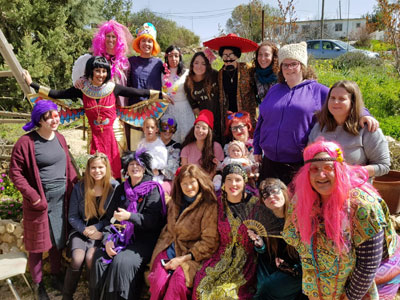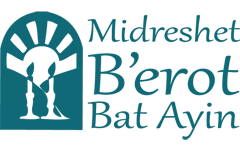Elul Newsletter 5778

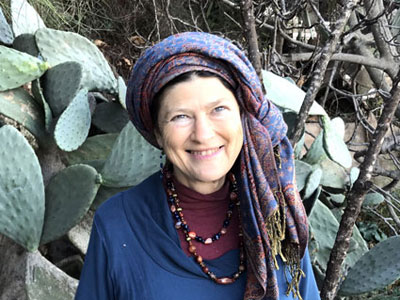

I’m pleased to share with you a few highlights of Holistic Torah from the Land and give you the opportunity to partner with us in offering women of all ages and from all walks of life a unique integrated Torah experience which will strengthen their Jewish identity and prepare them for keeping a Jewish home.
We look forward to an exciting year of learning with a great group of students who are truly searching for spirituality and ready to immerse themselves in the wellspring of Torah. Midreshet B’erot Bat Ayin offers them the opportunity to find their personal connection with the Torah, identify with their roles as Jewish women in order to be prepared to raise Torah families in Israel.
Many of our students who are not from observant families, lack parental support and do not have the financial means to pay full tuition. As our policy is to never close our door to sincere suitable students, we hope you will take advantage of this opportunity to be part of their spiritual journey and support Holistic Torah for Women on the Land generously!
May Hashem bless you with health, happiness, love and abundance from Above and below!
שנה טובה תכתיבו ותחתימו
Shana Tovah, Tikateivu v’Tichateimu!
May you be inscribed in the Book of Life!
With Blessings of the Torah & the Land,
Chana Bracha Siegelbaum
A D’var Torah from Rebbetzin Chana Bracha Siegelbaum

The two days of Rosh Hashana correspond to Leah and Rachel respectively. Just as these two days are considered as one, so did these two sisters unite to the extent that they became as one.
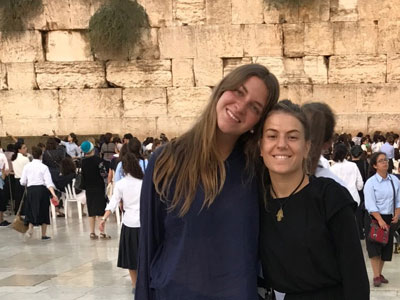
Rosh Hashana – The Day of Universal Unity
Rosh Hashana is the time for achieving unity with Hashem, the Jewish people and the entire universe. It is also when we work on uniting the fragmented part of our own psyche while connecting the moment with eternity. The unity between all Jewish people is reflected in the two-day celebration of Rosh Hashana, not only in the Diaspora but also in the Land of Israel. Unlike the other holidays of the Diaspora, both days of Rosh Hashana are unified and considered Yoma Arichta –‘one long day’ (Rambam, Mishna Iruvin 3:7). Yet, Rosh Hashana is not exclusively for Jewish people. The entire universe is judged on Rosh Hashana – all creatures pass before Hashem and are viewed with a simple glance. The Creator sees their hearts together and considers all their doings (Babylonian Talmud, Rosh Hashana 18a).
On the first day of Rosh Hashana, our spiritual aspect for the coming year is born. The second day is when our physical life is determined (The Remez, Zohar Shemot p. 401). The fact that Rosh Hashana is ‘one long day’ teaches us that both the spiritual and physical aspects of our lives must become one. Cleaning our home or cultivating the land becomes a spiritual endeavor when we bring mindfulness of the mitzvah into our work. Torah learning can penetrate our entire being, when we express the holiness of its creeds in speech and deed.
The two days of Rosh Hashana correspond to Leah and Rachel respectively. Just as these two days are considered as one, so did these two sisters unite to the extent that they became as one: “The feet of Leah ensconce within the crown of Rachel” (Etz Chaim 38:3). The first day of Rosh Hashana corresponds to Leah, who is associated with the eternal, hidden world. On this day, we read about her descendants Shemuel the prophet and Mashiach, who will build the third, eternal Temple. The second day, when we read the haftarah about Rachel crying for her children, corresponds to Rachel who is associated with the revealed, temporary world. The moment when Ya’acov met Rachel was the deepest meeting of souls. However, this union was only momentary, as she was not to join him by his eternal resting place.
If we only live in the moment without thinking about the consequences of our actions, what are we? Yet, what do we accomplish by always planning ahead and worrying about the future, never allowing ourselves to take a deep breath and being present in the moment?
On the first day of Rosh Hashana we reflect on where we are headed for the coming year – achieving perspective of our lives. The second day invites the opportunity to be truly present and experience standing before the King. Yet, these two ways are really ‘one long day,’ just as Rachel and Leah exemplify the greatest unity of sisterhood. They became as one person through ultimate giving and mutually ingraining the character-traits of each other. In the haftarah of the second day of Rosh Hashana, Rachel, the shepherdess – involved in the physical world, entered Leah’s hidden domain of heartfelt, tearful prayer. She learned from Leah’s tears to cry so deeply that Hashem promised to redeem the Jewish people in her merit.
On Rosh Hashana, there are two types of judgment. On the first day, we are judged with דינא קשיא/dina kashia – ‘harsh judgement,’ whereas on the second day we are judged with דינא רפיא/dina rafia – ‘soft judgement.’ These two kinds of judgments are connected as one string, just as the two days are connected as ‘one long day.’ The strict judgment of each individual are sweetened on the second day of Rosh Hashana, when we unify completely as a community. Only then can we truly declare Hashem as King during the blowing of the shofar, which is one of the main reasons for the mitzvah of shofar. As Rambam states, quoting Tehillim 98:6: “With trumpets and the sound of the Shofar, raise your voices (הָרִיעוּ /hariyu) before the King, Hashem” (Rambam, Laws of Shofar 1:2).
The blasts of the shofar on Rosh Hashana engender the birth of the New Year making Rosh Hashana the mother of the year. The numerology of Rosh Hashana, 861, equals the sum of all numbers from 1 to 41 – אֵם/eim – ‘mother.’ This is also the value of בֵּית הַמִּקְדָּשׁ/Beit Hamikdash – The Temple, for the mother, represents the home and builds it into a holy sanctuary. I bless all of us that we will be able to walk in the footsteps of Rachel and Leah and truly unite on all levels in order to birth a blessed year for each other, the world and ourselves!
B’erot Student Experience by Elisheva
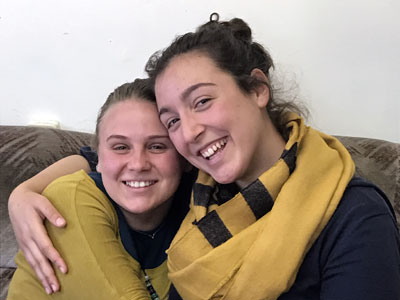
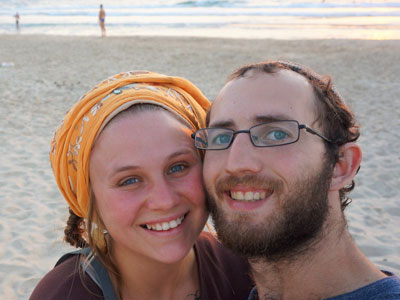
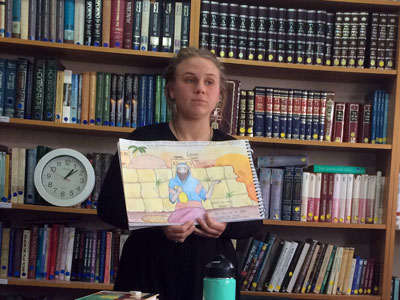
I grew up in a beach town in California. My relationship with my Jewishness did not extend beyond my family’s holocaust trauma and eating latkes on Chanukah. When I left home to explore Israel and my Jewish roots, I wasn’t interested in becoming observant. I specifically remember telling my mother “Don’t worry, I won’t become Orthodox.”
I arrived in Israel with the intention of travelling to many different countries afterwards. At first, I worked on a farm for a secular family in Moshav Matta. I felt inexplicably strange and uncomfortable each time I had to work on shabbat. Working hard on the farm while the land and everyone else were resting didn’t feel right, so I decided to leave the farm. I knew I wanted to learn about Judaism, but I felt out of place in every seminary I tried.
My best friend, Ariella had begun to study at B’erot Bat Ayin. I vividly remember my first time coming to visit her in there. While walking down the hill, the view opened to the stunning dramatic landscape. Coming into the homey caravan, Ariella made me herbal tea they had picked in class that day. I took a deep breath and let out a tear of joy; I felt so at home. I talked with the teachers and staff and decided I wanted to join the midrasha.
I made a decision to pause everything in order to learn Torah and work on myself so that I could start my life in Israel with strength and emunah. The year I spent in B’erot Bat Ayin transformed me. Being in nature, working the land, surrounded by inspiring women (who are all now lifelong friends) was exactly what I needed. I unearthed my relationship with Hashem that laid a foundation with Him for my whole life.
In my last couple of weeks in B’erot, I got a ride with a woman. I mentioned that I didn’t have a smartphone and explained why. She half-jokingly suggested, “Hey my Israeli brother-in-law doesn’t have a smartphone for the same reason, maybe you should go on a date.” She explained he was the youngest of 8 children of a dati-leumi family from the Golan and casually mentioned that he might not speak much English. Later that night she texted me saying that if I was interested, she would call her brother-in-law. I was thinking to myself, “If I did go on a date with him, it would just be for practice…how could I marry an Israeli?”
He turned out to be the most Israeli man I had ever met! Half the conversation of the first two dates we talked about what he did in the army… It wasn’t until the third date when we began to open up and I saw clearly that we had the same values and life goals. We were both so ready and prepared for marriage. It quickly became clearer than day that we were soul mates.
I had been praying my entire time in Bat Ayin that Hashem would send me my soul mate as soon as I left the Midrasha. My prayer was answered so loudly and quickly! Nine months later in Adar 5778 we got married. I am now part of an enormous Israeli family. My family from California loves Israel and are so close with our in-laws. I am so grateful for my time spent in B’erot, without which my life would be lacking the spiritual foundation for marriage and Jewish life!
Elana Roth’s Comeback as Dormother
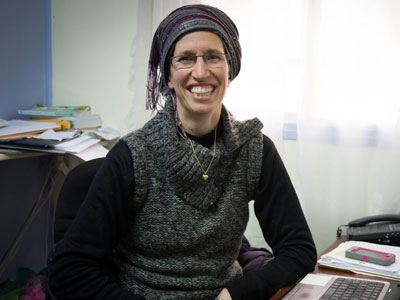
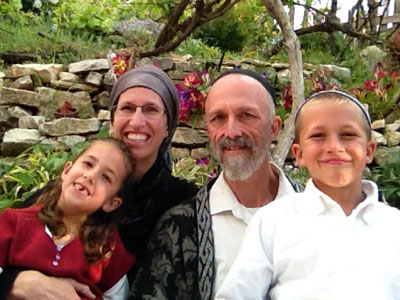
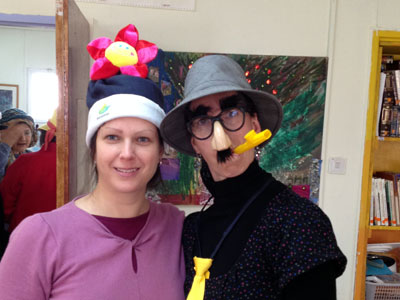
Elana Roth wears many hats in Midreshet B’erot Bat Ayin. Besides being the director of administration and PR for over 10 years, she is an alumna of 15 years, who served as our dormother 13 years ago. We are exhilarated to welcome Elana Roth back as dormother along with her husband Yehoshua and their children Eli and Na’ama Chana. Without any doubt, the students of year 2018-2019 are extremely fortunate to benefit from Elana’s caring, capable and kind personality. We had a chat with Elana about her reflections on B’erot Bat Ayin and her plans for contributing in the upcoming year. We wish Elana and her personal family as well as her extended B’erot family much success and growth this upcoming year!
What initially brought you to Midreshet B’erot Bat Ayin? Hailing from Colorado Springs, Colorado, I never got a solid Jewish education, and as a newly observant, newlywed in 2003, I wanted to immerse myself in Torah for three months in Israel. Midreshet B’erot Bat Ayin appealed to me, due to its serious textual study and holistic perspective. I gained much from my study at the midrasha and from the Bat Ayin community. We returned to Colorado for a couple of years and then made Aliyah directly to Bat Ayin in 2005. When we asked Rebbetzin Chana Bracha to be a reference on our Aliyah application, she invited us to join the midrasha as dorm parents for the 2005-2006 school year. This was the beginning of our longstanding relationship with B’erot!
Have you seen many changes at Midreshet B’erot Bat Ayin over the years? My 15-year connection with B’erot has been quite an adventure. I’ve had the opportunity to know countless women progress through their personal journey. Each student is unique and grows on multiple levels, here at B’erot. It has been a privilege to help them along on their journey. Since I was first here as a student, the midrasha has become much more adept and established. I remember we would learn in a tiny dormitory room in one of the caravans. Now we have a spacious Beit Midrash, classroom and a well-equipped communal kitchen, with industrial refrigerators. There is always room for improvement, but slowly with the help from our donors, we have been able to make life more comfortable for our students. The dormitories have been remodeled with AC/central heat, and we have exchanged one caravan with our very first real building. The dorm parent caravan is light years better than it was 13 years ago. There isn’t even a comparison. Now that our family has grown, the added additional space and the remodeling of the bathrooms will make it much more comfortable for our family.
How do you think this year will be different for you personally as dorm mother? Having lived in Israel for a while, I can now manage much easier in Hebrew and know a bit more about handling the bureaucracy and other difficulties that our students often face. I clearly remember my own challenges when I wasn’t so fluent in Hebrew. Even simply buying things in the store was a hurdle. I hope to be able to help the students negotiate through their challenges and strengthen their emunah. Having become a mother myself in the last ten years, I’ve learned many things from my children that I believe will help me be a much better dorm mother for the women coming for either a short or long period of time.
What do you foresee as your roles this upcoming year as dorm parents? Yehoshua’s role will mostly be helping with maintenance around the campus. However, we are also looking forward to being able to offer guidance to our students during the year, whether on Torah issues, personal issues, or just helping them adjust to a new culture, language or country. Many of our students are completely alone in Israel as they walk in Avraham Avinu’s footsteps, who followed Hashem’s calling to, “Go for yourself from your land, from your relatives, and from your father’s house to the land that I will show you” (Bereishit 12:1). We hope to extend the support our students need so they can have a smoother transition to life here in Israel. This support is vital to offer both while the women are in our program as well as afterwards, as a large percentage of our students make Aliyah after they graduate from B’erot.
Mazal Tov! Mazal Tov!
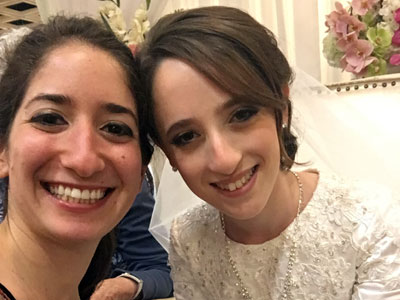

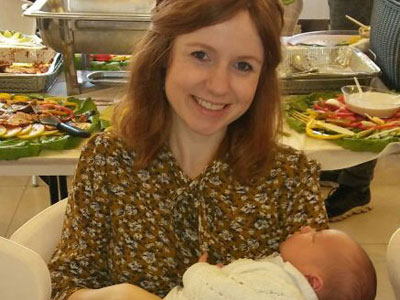
Weddings Ahuva Gamliel to Shawn Snow | Meital Garcia de Vinuesa to Alfonso Yitzchak Helforn | Carol Mondlak to Moy Schwartzman | Yael Ashen to David Chetrit | Elisheva Grant to Hayim Ryesky | Elisheva Holtzman to Yehoshua (Shushu) Ztvi Chaimov | Madeline Webb to Chaim de Silva | Rebecca Delshad to Gilad Ahdout | Esther Shaw to Benzion Aryeh Levin | Dafna Fliegelman to Elisha Milstein
Births Ariella (Weiss) | Ariella Malka Kranitz | Gani Goodman | Leah (Gillson) Peleg | Nava Brown | Sarah Friedlander | Shaindel Siskind Deutsch | Shoshana Beck | Ziesel Miriam Rahimi
Engagements Leora Kaufman to Alon Lurie | Sarah Nechama Rodenstein to Louis Jay
Aliyah Adina Pavlova | Leah Peleg | Meital Helforn | Nehora Jochems | Sarah Freida Cutler | Teli Raphael
Donation Opportunities
As the year is coming to a close, open up your heart and hand, to support Holistic Torah for Women on the Land!
Join our Chai Club (monthly donations) & help us build the mind, bodies and souls of our students or make a one time donation…
Sponsor a Student, Program, Project or Event:
Year scholarship $10,000
Two-week program $1,800
One-week seminar $1000
Torah class for a month $360
Rosh Chodesh program $180
Parasha Meditation Book Dedication $100
Parasha Magazine Dedication $36
Dedicate New Building:
Upgraded room in new dormitory $12,500
Built in wooden cabinets $300
Dedicate Memorial Garden Project:
Flagstone Pathway $3,600
Strawberry Field $2,500
Herb Garden $1,000
Sponsor a Picnic Table $700
Sponsor a Bench $500
Flower and vegetable garden irrigation system $360
Dedicate Communal Kitchen Remodeling for Wholesome Living
Communal Kitchen Cabinets $5000
Communal Floor Remodeling/Resurfacing $3000
Tiling behind Kitchen Sink $1500
Kitchen Solar Heated Water System $1000
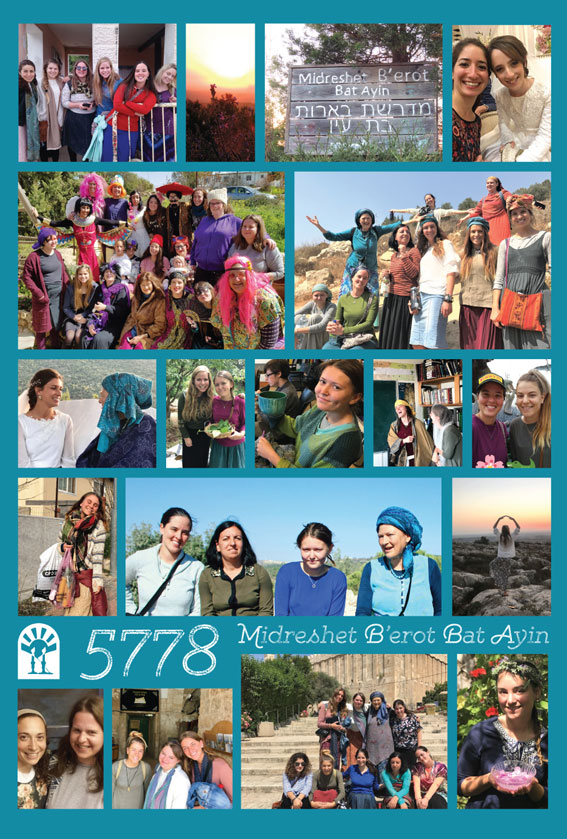
Ready to Change Lives?
$US and Israeli Shekel Tax Deductible Receipts available!
Thank You!

